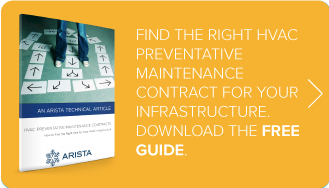When you have electrical issues related to your air conditioner, you might not be able to tell what’s causing the problem: your air conditioner or the electrical system in your space.
It’s no secret that electricity is nothing to fool around with. If you’re not an expert in wiring and electricity, the danger is enough (as it should be!) to keep you from trying to figure it out on your own. But then who do you call? The AC guy or the electrician?
In most cases, your first call should be to your air conditioning service company. There are a number of power-related problems that can cause AC failure and performance issues, and an AC service tech is qualified to diagnose the problem, and properly trained in how to work around high-voltage electricity.
1. AC failure after a power outage
Did a thunderstorm take out the power in your home or business? If so, a lightning strike probably caused a power surge that tripped the breaker. Even if it was just a seemingly random outage not caused by a storm, there can still be an electrical surge when the power returns, and that can also trip the breaker. That’s just the circuit breaker doing its job of protecting your equipment.
Check your electrical box to see if a breaker has tripped. If so, reset the breaker and turn the AC unit back on. If the unit won’t start up again, the system has sustained more damage and you’ll need to call in an air conditioning repair technician.
2. AC won’t turn off
If your air conditioner doesn’t turn off even when the set temperature is reached, you may have an issue with the electronic controls. Your thermostat could be malfunctioning or the sensor may have been knocked out of position.
3. AC is tripping the circuit breaker
If your air conditioner does start up again after you reset the breaker, but then it trips again a short time later, you have a more difficult problem on your hands.
IMPORTANT: If the circuit breaker is tripping repeatedly, don’t turn it back on! The circuit breaker’s job is to protect your building, wiring, and equipment by shutting off the flow of electricity when the current flow gets too high. If it keeps tripping, you could risk a fire if you turn it back on.
If it’s only the air conditioner that’s tripping the circuit breaker, it’s a sign that that the unit is overheating and drawing too much power. Overheating can easily lead to AC failure, and may be caused by any of the following underlying issues:
Electrical components: loose connections, a bad capacitor, or a short in the equipment’s wiring can be the culprit.
Refrigerant leaks: your unit’s refrigerant lines may have developed holes or cracks, causing a leak of refrigerant. When your air conditioner’s refrigerant charge is too low, it puts a strain on the system that causes it to work harder and leads to overheating and AC failure.
Fan motor issues: if the fan that helps remove heat from the condenser has failed or is not working properly, the system can overheat.
Evaporator coil freeze-up: When you have reduced air flow in your system, which can be caused by clogged air filters, blocked vents, or a faulty fan, the outside of the evaporator coil can become coated with ice. That makes the system run continuously without cooling, eventually causing overheating and AC failure. You can also end up with water leaks causing damage to your space and furnishings.
Dirty condenser coil: When your outdoor unit’s condenser coil gets coated with dirt and debris, it can’t effectively release the heat that’s removed from the air in your space. That can easily cause overheating, which if not addressed often leads to the next item on the list: compressor failure.
Compressor failure: this is probably the worst case scenario. The compressor is the heart of the system, and when it fails it’s very expensive to replace. You may find yourself shopping for a new air conditioner.
POOR MAINTENANCE Very often, all of the issues mentioned above have one root cause: poor upkeep and maintenance of your air conditioning system.
Related Article: 8 Ways AC Preventative Maintenance Keeps the Repairman Away
4. Your electric bill has skyrocketed
If that happens at this time of year when the temperatures are still moderate, it’s definitely a cause for concern. Your air conditioner is probably running more than it should because it’s having trouble cooling the space. And more than likely, that’s due to one of the causes mentioned above: dirt and debris impeding air flow, a refrigerant leak, or even a problem with the fan motor.
Related Article: 15 Tips to Keep Your Energy Bills From Skyrocketing This Summer.
Maintenance prevents AC failure
Did you know that most of these issues can be easily prevented with regular AC preventative maintenance? The US Department of Energy’s web site Energy.gov lists inadequate maintenance as one of the most common causes of AC failure.
It’s time to have your air conditioning system thoroughly inspected by the pros before you have a serious AC failure on your hands.
Regular air conditioning maintenance takes care of many of the underlying problems that cause AC failure, including dirty coils, poor air flow, clogged filters, drainage issues and faulty controls. Your maintenance technician can also find an fix problems with the electrical components, fans and refrigerant leaks before they lead to AC failure.
Since every space is different, it’s important to have a maintenance plan that’s designed for the age, type and condition of your equipment, the occupancy and usage of your space, as well as your budget. Find out how to get exactly what you need with our helpful guide to HVAC Preventive Maintenance Contracts: How to Find The Right One For Your HVAC Infrastructure.

